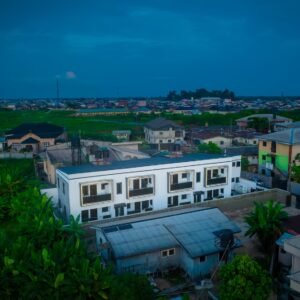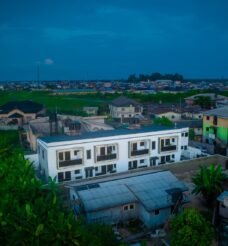Introduction to Effurun
Effurun is a notable town situated in Delta State, Nigeria, recognized for its pivotal role within the region. Geographically, Effurun is located adjacent to the well-known city of Warri, which significantly enhances its accessibility and economic interaction with larger urban centers. The town lies within the heart of Delta State, a region characterized by its rich cultural and historical heritage, making Effurun an integral part of this narrative.
Effurun boasts a blend of modern and traditional elements, contributing to its vibrant atmosphere. As part of the Warri metropolitan area, Effurun serves as a central hub for commerce, education, and social activities, attracting residents and visitors alike. The town’s strategic location offers a seamless connection to various parts of Delta State and beyond, facilitating both economic and social exchanges. Its proximity to key infrastructures, such as major roads and transportation hubs, amplifies its significance in the region.
Cultural diversity is one of Effurun’s defining traits, with an array of ethnic groups contributing to the town’s unique identity. The most prominent groups include the Urhobo, Itsekiri, and Ijaw, each bringing distinct traditions, languages, and customs that enrich the social fabric of the area. This multicultural environment fosters a spirit of cohabitation and mutual respect, making Effurun a model of harmony amid diversity. The fusion of different cultural practices is evident in various aspects of life, from festivals to everyday interactions, showcasing the rich heritage that defines this town.
In essence, Effurun represents a notable confluence of geography, culture, and economic potential within Delta State, highlighting its importance not only as a residential area but also as a vital part of Nigeria’s evolving narrative.
Historical Background of Effurun
Effurun, a bustling town located in Delta State, Nigeria, has a rich historical background that reflects the evolving narrative of its community. The town is believed to have been founded centuries ago by indigenous inhabitants who were primarily from the Urhobo ethnic group. These early settlers established a vibrant community centered on agriculture and trade, harnessing the fertile lands surrounding the area. As Effurun grew, it became an important hub due to its strategic location near the city of Warri, consequently influencing its development.
Throughout the years, Effurun has experienced various significant historical events that contributed to its identity. The town became notable during the British colonial era, which introduced new administrative systems and socio-economic changes. This period allowed for the introduction of modern education and healthcare services, which transformed Effurun into a more structured community. Additionally, the discovery of oil in the 20th century further accelerated Effurun’s growth, attracting migration and investment, thereby altering the demographic landscape of the town.
Several landmarks in Effurun hold profound historical significance. For instance, the Effurun Market serves as both a commercial center and a cultural gathering place, showcasing the town’s rich heritage through its bustling trade activities. Another important site is the Effurun Roundabout, which has become a landmark symbolizing the town’s connectivity and growth. Over the decades, these sites have witnessed a multitude of events, both mundane and monumental, enhancing Effurun’s position as a focal point in Delta State. The interplay of history, culture, and commercial activity continues to shape Effurun’s identity, offering insight into its past and illuminating the path of its future.
Economy and Infrastructure
Effurun, a prominent town in Delta State, Nigeria, showcases a diverse economic landscape. The economy is primarily driven by several key industries, including trade, agriculture, and manufacturing. Trade plays a significant role, with Effurun functioning as a commercial hub that connects neighboring towns and cities. Markets in the area are bustling, providing vital goods and services to the local population and generating substantial economic activity. Agriculture also contributes significantly to the economy, with many residents engaged in both subsistence and commercial farming. Notable crops include cassava, rice, and various vegetables, which play a crucial role not only in local diets but also in sustaining trade.
The manufacturing sector in Effurun, while still developing, has started to gain traction, contributing to the local economy by creating jobs and promoting entrepreneurship. Industries such as food processing and textile production are emerging, and as the demand for locally produced goods rises, the sector is poised for growth. Furthermore, the availability of natural resources in Delta State provides a foundation for businesses to flourish.
Infrastructure is a fundamental aspect of the region’s economic landscape, with transportation networks playing a critical role in linking Effurun to larger markets and centers. Major roads and routes provide access to various parts of the state, facilitating the movement of goods and people. Additionally, Adequate healthcare facilities are essential for maintaining the well-being of residents and supporting a productive workforce. Effurun has seen investments in healthcare initiatives aimed at improving services and accessibility for the community. Educational institutions also play a pivotal role, with schools designed to equip the younger population with skills and knowledge necessary for future contributions to the economy.
Ongoing development projects in Effurun seek to enhance the quality of life for residents and stimulate growth in local commerce. Improvements in infrastructure not only promote economic activities but also attract investors looking for opportunities in the region. As Effurun continues to evolve, its economic prospects remain promising, driven by a combination of diverse industries, strategic infrastructure, and community initiatives.
Culture and Lifestyle in Effurun
Effurun, a vibrant town in Delta State, Nigeria, is rich in cultural diversity, reflecting the traditions and lifestyles of its inhabitants. The people of Effurun primarily belong to the Urhobo ethnic group, known for their distinct customs and celebrations. The community is deeply rooted in traditional practices that influence daily life, fostering a sense of identity and belonging among its residents. From local attire to traditional arts, Effurun’s culture is a colorful tapestry woven with age-old practices.
One of the most significant aspects of life in Effurun is the celebration of festivals, which serve to unite the community and showcase their rich heritage. Among the most prominent events is the Urhobo Cultural Festival, which features traditional music, dance, and art. During this festival, locals don traditional garments, participate in various cultural displays, and partake in storytelling sessions that preserve their history and legends. These festivities not only reinforce communal bonds but also attract visitors who seek to experience the local culture firsthand.
The culinary scene in Effurun is equally noteworthy, with a variety of local dishes that are emblematic of the community’s culture. Popular meals often include staples such as pounded yam paired with delicious soups made from local ingredients, showcasing the flavors and creativity of the region. Street food vendors further contribute to the diverse culinary landscape, offering specialties that are both affordable and reflective of the town’s gastronomic heritage.
Social dynamics in Effurun are characterized by strong community spirit, with residents often engaging in communal activities that strengthen social ties. Neighborly relationships prevail, and local gatherings, whether for celebrations or community discussions, are common, fostering a collaborative environment. The lifestyle in Effurun embodies a blend of tradition and modernity, where generations interact, sharing wisdom and experiences while adapting to contemporary influences.




